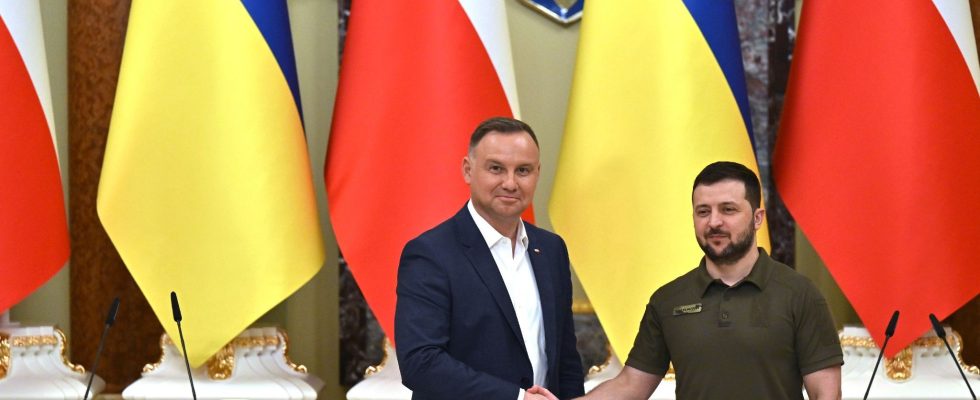For Ukrainians, Poles are more than just neighbours. This is demonstrated by a study by a kyiv-based polling institute, the International Republican Institute, made public at the end of March. When asked which country and international organizations they believe have provided the most support to Ukraine in the face of Russian military aggression, Ukrainians spontaneously place Poland and the United States in equal lead (71 %), ahead of the United Kingdom (48%), Germany (17%), the European Union (6%) and France (5%).
Aware that their military survival, in the long term, largely depends on American support, the Ukrainians do not forget the unfailing solidarity shown by the Poles. Volodymyr Zelensky’s visit to Warsaw on Wednesday 5 April marks this recognition more officially. “After the visit to Washington, then the tour to London, Paris and Brussels, it was time for Kiev to make a gesture towards Poland, one of its strongest and earliest supporters”, points out Lukas Macek, researcher associated with the Jacques-Delors Institute.
According to figures from the United Nations Organization, more than one and a half million Ukrainian refugees are currently living in Poland, the country which hosts the most refugees, ahead of Germany (one million). Often housed, at least initially, by Polish families willing to help them spontaneously, they benefit from local public services (health, school) and some have been able to find work. In all, the Polish border police recorded more than 10.5 million exits from Ukrainian territory for 8.1 million returns.
A European Union country with the longest border with Ukraine, Poland is not only a migration hub. Aid to its neighbor passes mainly through its territory, starting with international military aid, via the airport of Rzeszow airport, in the south-east of the country, or its ports. By drawing on its stocks, Poland has also risen to third place in the world in this area, behind the United States and the United Kingdom, according to the count of the German research center Kiel Institute. It thus provided approximately 300 Soviet tanks which it still possessed and began to deliver MiG-29 fighter planes.
A painful common past
Above all, Poland put pressure on other European governments to deliver more weapons to Kiev, as was the case with the Leopard 2, German-designed battle tanks that it threatened to supply in dispensing with authorization from Berlin, recalls Pawel Zerka, political scientist at the European Council on International Relations.Proof that it is indeed Kiev’s main ally, Poland was also among the first countries to plead for official recognition. of Ukraine’s candidacy for the European Union, finally granted by the Twenty-Seven.”
The relationship between Poles and Ukrainians, brought together by the Russian imperialist threat, remains however marked by a painful past. “This year marks 80 years of the massacres of 100,000 Poles in western Ukrainian territory by extremist nationalists during the Second World War, recalls Pawel Zerka. There is a possibility that the Polish far right, with the elections next autumn’s legislative elections, plays on this with a population sensitive to such discourse, by affirming that Polish ethnicity, as well as public services, would be threatened by an excessively massive influx of Ukrainian refugees.
In view of surveys, the ultraconservatives of the right and justice party (PiS), currently in power, may well have to ally with the extreme right in the next election. In the meantime, “the government appears to be Ukraine’s main ally, treated seriously by the United States and other Europeans and showing strength and determination in the face of war”, observes Pawel Zerka.
“There is a flag effect in this war situation, abounds Lukas Macek. But it is not sure that it plays that much for the next elections, because support for Ukraine is consensus, and it is difficult to accuse the leader of the main opposition party (Civic Coalition), ex-Prime Minister Donald Tusk, of pro-Russian inclinations. He could even argue that support for Ukraine would be more effective if the relationship were calmed down with the rest of Europe, contrary to the policy of marginalization of the PiS on the rule of law. It remains to convince the voters: at the end of March, the polls gave between six and nine points ahead of the incumbents (PiS allied with two other small parties) over the Civic Coalition.
